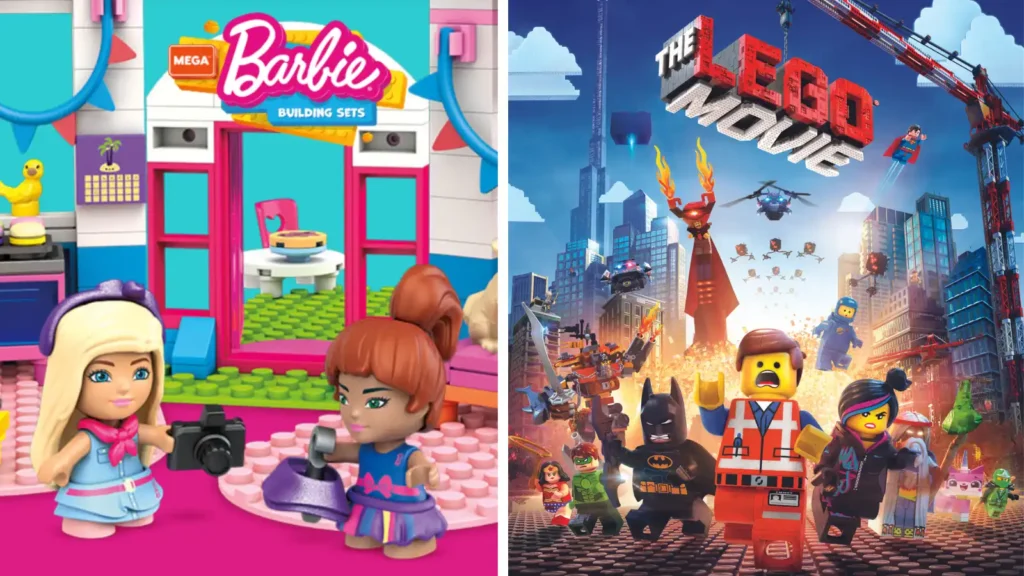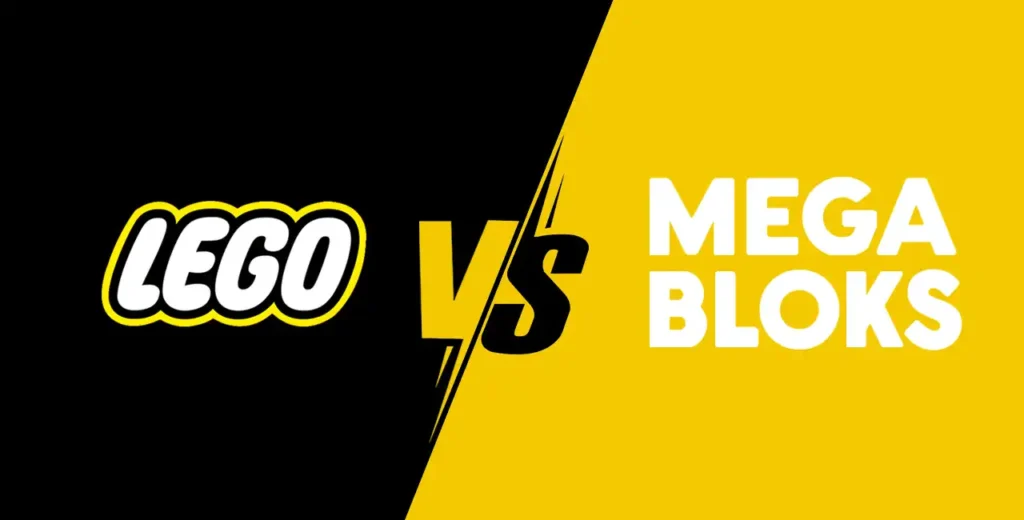The worlds of Lego and Mega Bloks represent two distinct narratives in construction toys, each with its unique influence in popular culture and fan communities. This comprehensive article delves into their brand recognition, cultural impacts, fan base dynamics, creative expression, and collecting and trading aspects.
Brief Comparison
| Aspects | Lego | Mega Bloks |
|---|---|---|
| Year Established | 1932 | 1967 |
| Headquarters | Billund, Denmark | Montreal, Canada |
| Product Offerings | Interlocking plastic bricks, themed sets, video games, movies, and more | Interlocking plastic blocks, themed sets |
| Price Range | Varies widely from affordable sets to expensive collector items | Generally more affordable than Lego |
| Popular Themes | Star Wars, Harry Potter, City, Technic, Friends, and more | Halo, Barbie, Thomas and Friends, Minions, and more |
| Targeted Groups | Children and adults of all ages | Younger children and parents, some adult collectors |
Brand Recognition

Lego: A Universal Brand
The brand recognition is a testament to its long history and consistent quality. Established in 1932, it has become a household name, synonymous with creativity and quality. The brand’s evolution reflects its adaptability and commitment to maintaining a strong connection with its consumers, regardless of age.
Historical Consistency
The branding strategy has been marked by a balance of tradition and innovation. The classic brick has remained largely unchanged, so it can be compatible with generations of sets. Keeping consistent fosters a sense of nostalgia and loyalty among older fans while continuing to attract new users.
Global Marketing
Lego’s global presence is unrivaled, with aggressive marketing strategies and a widespread distribution network. The brand has mastered the art of global marketing. When adapting its message to different cultures it still maintains a cohesive brand identity. This universal appeal is evident in Lego’s presence across over 130 countries, which helps it become one of the most recognized toy brands in the world.
Mega Bloks: A Distinct Competitor
Mega Bloks, though not as globally recognized as Lego, holds a significant place in the construction toy market. Established in 1985, it has quickly grown to become a notable competitor.
Focus on Compatibility and Differentiation
Mega Bloks has strategically focused on being compatible with Lego bricks. By doing so, it allows this brand to appeal to the vast Lego user base. At the same time, it differentiates itself with unique themes and sets that cater to different interests and age groups. This approach makes Mega Bloks carve out its niche in the construction toy market.
Marketing Strategies
While Mega Bloks is well-known, it hasn’t reached the same level of global recognition as Lego. This can be attributed to differences in marketing strategies and the brand’s relatively shorter history. Mega Bloks has focused on penetrating specific market segments, such as younger children and those looking for Lego alternatives.
Culture Appearance

Lego: The Cultural Pioneer
The journey in popular culture is a blend of strategic branding, innovative content creation, and persistent engagement with diverse audiences. Its influence extends far beyond the realms of traditional toys.
Cinematic Ventures
“The Lego Movie” series is a prime example of cultural influence. These films did more than just entertain, they transformed the toy brand into a narrative medium, telling stories that resonated with both children and adults. The movie’s success proved Lego’s ability to transcend age barriers and embed itself in the collective consciousness of a broad audience. The series cleverly combined humor, creativity, and emotional depth. It could leave a lasting impression on people’s minds that Lego bricks are not just a toy but a storytelling element.
TV and Gaming Integration
The emergence in television and gaming further amplifies its cultural reach. Shows like “Lego Masters” bring the Lego experience into family living rooms, showcasing creativity and teamwork in a competitive way. This not only promotes the brand but also inspires viewers to engage in Lego building. In gaming, the “Lego Star Wars” series and other Lego-themed games offer an interactive experience, which merges the joy of gaming with the creativity of building. These ventures expand Lego’s influence into new digital realms as it appeals to gamers and fans of various franchises.
Cultural References
Lego’s integration into mainstream media goes beyond its own branded content. The brand frequently appears in various forms of media, from sitcoms to late-night shows, often as a symbol of creativity or a nostalgic reference. This kind of cultural embedding has reinforced Lego’s status as a cultural icon.
Mega Bloks: Building a Different Narrative
While not as pervasive as Lego in cultural representation, Mega Bloks has carved its path.
Cinema and Multimedia Presence
Unlike Lego, Mega Bloks hasn’t made significant inroads in the film industry. The absence of a blockbuster movie like “The Lego Movie” means that Mega Bloks misses out on this powerful cultural medium. However, this does not imply that the brand is absent from popular culture. It has made appearances in various forms, despite a smaller scale.
Franchise Partnerships
Mega Bloks has engaged in various licensing deals with popular franchises, but with a different approach compared to Lego. These partnerships have included themes like “Halo”, “Barbie”, and “Thomas the Tank Engine”, which appeal to different segments of the toy market. While these collaborations haven’t gained the same cultural momentum as Lego’s high-profile partnerships, they have helped this brand establish a unique identity in themed construction toys.
Educational Outreach
Mega Bloks focuses on educational outreach by positioning its products as tools for learning and development. This aspect has led to collaborations with educators and parents, which creates a narrative that emphasizes the brand’s role in fostering creativity and learning in early childhood.
Fan Communities

Lego: A Diverse and Engaged Community
Lego boasts a robust and diverse fan community that includes all age groups and geographies. The brand’s ability to appeal across age ranges is a key factor in its widespread fan base.
Global Fanbase
Lego’s global fanbase is a testament to the brand’s universal appeal. Its fans range from young children to adult builders, each finding different ways to express their creativity through Lego. The brand transcends cultural and language barriers, making it a unifying medium for fans around the world.
Community Events
Lego fan conventions and online forums are vital in fostering a sense of community. Events like Lego World and BrickCon offer fans a platform to show their creations, exchange ideas, and celebrate their shared passion. Online, forums and social media groups provide a space for global interaction, sharing techniques, and collaborating on projects.
Mega Bloks: Growing Communities
Mega Bloks’ fan communities, though not as extensive as Lego’s, are showing significant growth.
Emerging Fanbase
The fan community around Mega Bloks is gradually growing, with a noticeable trend both online and offline. The brand attracts a varied demographic, including younger children and parents looking for age-appropriate construction toys. The community is also marked by collectors and hobbyists who appreciate Mega Bloks’ unique offerings.
Online platforms are increasingly becoming hubs for Mega Bloks fans to connect, share their builds, and engage in challenges. These spaces are crucial for community building, allowing fans to share their passion and creativity with a broader audience.
Creative Expression
In the realm of creative expression, Lego fans are known for their innovative designs and community contributions. Fan-built models range from intricate architectural wonders to expansive fantasy landscapes. These creations inspire a wealth of customization techniques and personal stories.
Mega Bloks enthusiasts exhibit creativity through their builds, with specific examples demonstrating the versatility and unique appeal of Mega Bloks. The brand’s custom projects contribute significantly to its fan community, showcasing the creative potential it holds.
Collecting and Trading
Collecting and trading are integral to Lego’s culture, with a thriving collector community and a dynamic resale market. Rare and retired Lego sets are highly sought after, and online platforms facilitate trading and investment opportunities.
Mega Bloks also has a collector community, with certain sets and figures gaining popularity among enthusiasts. The trading and resale market for Mega Bloks, while active, does not yet match the scale of Lego’s, but it contributes to the brand’s narrative in the collector’s world.
Conclusion
In comparing Lego vs. Mega Bloks in Popular Culture and Fan Communities, it is evident that while both brands hold significant places in the construction toy market, Lego leads in terms of cultural impact, brand recognition, and fan community engagement. Mega Bloks, with its unique appeal and growing fan base, continues to carve out its niche, offering distinct experiences to fans and collectors. Each brand’s journey reflects its strategic choices, market appeal, and the unique experiences it offers to its audience worldwide.






27 Responses
Alex loves anything Star Wars sets
I love those too!
Star wars sets are super cool
My first time I fited blocks was at a friend anyversary “lego party” when I was 10 years. For the truth we played with Mega Bloks, were cheaper than LEGO. Since then I loved to play with and improvise, then, later I bought used and incomplete sets of bricks.
That’s a wonderful memory!
Nothing wrong with second hand bricks!
when i was 7 years old
That must have been an exciting time to discover brick toys!
I feel like Mefablocks are geared towards younger kids
I always knew about Mega Blocks but I always considered them for children. I used to play with LEGO as a child and in the past few years I have acquired many sets of Lego brand as well as multiple other brands.
This is a fascinating and informative article!!
It’s interesting how building blocks like Mega Blocks and LEGO appeal to all ages, often bringing back fond childhood memories.
Megablok will always feel like the gateway brick to me
I always feel like Lego is geared towards older folks and duplo and megablok are for a younger crowd
That’s a common perception.
I just donated all my boys MegaBloks as they have outgrown them. They love all things duplo and lego and of course JM Bricklayer!
It’s heartwarming to hear that you’ve donated your boys’ MegaBloks to others who can enjoy them now.
I can’t remember what age but I used to love doing the Lego friends with my daughter when she got right into around she 7/8.
LEGO Friends sets are a fantastic choice for kids around the age of 7 or 8.
I never had lego friends
It was probably the year 1990 when I can first remember getting Legos, I remember building a castle Christmas morning with my dad in the living room and thought it was the greatest thing ever. Now I get to enjoy the experience all over with my twin 6 year olds.
That’s a wonderful memory!
I took my brothers in 1993. They were considered boy toys and i loved them.
It’s heartwarming to see these experiences being passed down and enjoyed anew. Keep building!
Do you think you will make sets geared towards 5 to 8 year okds?
Sure! Although we currently do not have a dedicated product series for children aged 5 to 8, we’ll continue to explore new possibilities and market opportunities.
Mega Bloks, probably only recently from you.
Mega bloks is a worth-buying brand too.